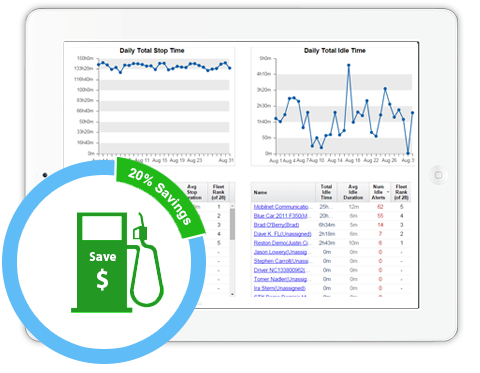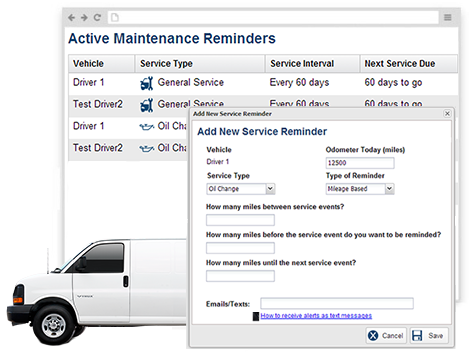Sending drivers into the field carries an element of risk that all fleet managers face every day. Instituting a fleet-wide safety policy is one way to reduce your liability and encourage safe and efficient driving habits, but the most effective strategy for mitigating your fleet’s risk is to understand how your drivers behave in the field.
GPS tracking devices act as your eyes while your drivers are on the road by collecting accurate, real-time driver behavior and vehicle usage data like up-to-the-minute vehicle locations, speed and direction of travel, and stop information. Not tracking vehicles leaves fleet managers in the dark about dangerous and wasteful driving behaviors, which in turn makes it more difficult to identify opportunities to reduce operating costs and increase revenue.
Here are eight more risks of not overseeing your drivers while they’re in the field:
Risk 1: Overspending on fuel

Tracking vehicles can help fleet managers reduce their fleet’s overall fuel consumption by up to 20%. Tools like real-time alerts for wasteful behaviors such as speeding, excessive idling, and unauthorized use, as well as detailed reports such as the idle report, make it easier for fleet managers to eliminate wasteful driving habits and in turn significantly reduce their fleet’s fuel costs.
Learn more about how GPS tracking can help you reduce your fleet’s operating costs.
Risk 2: More vehicle accidents
Unsafe behaviors like speeding and harsh braking increase your fleet’s risk of getting into an accident or causing an injury, leading to downtime as your drivers recover and your vehicle is repaired.
Understanding which drivers frequently commit unsafe behaviors using tools like daily safety report cards and visualized safety trends over time can help you take the appropriate steps to improve your fleet’s safety one vehicle at a time. In fact, most drivers operate their vehicles more safely when they know that they are being tracked.
Risk 3: Higher insurance
Vehicle insurance is a major source of spending for fleet-based businesses, but it doesn’t need to be. Some insurance companies will provide a discount up to 30% for monitoring your fleet vehicles if you use a GPS tracking device.
Vehicle insurance is a major source of spending for fleet-based businesses, but it doesn’t need to be. Some insurance companies will provide a discount up to 30% for monitoring your fleet vehicles if you use a GPS tracking device.
Risk 4: Lost revenue
Not tracking your drivers limits your ability to effectively route and dispatch your vehicles, so you may not be able to reach as many customers on a daily basis. By streamlining dispatch and helping fleet managers identify opportunities to optimize routes, GPS tracking can help improve your fleet’s productivity, which means more money in your pocket.
Risk 5: More vehicle breakdowns

Manually tracking routine and preventive maintenance schedules for each vehicle in your fleet is time consuming and prone to error. With a GPS tracking device, you can automate your maintenance schedules and receive reminders when maintenance is due, leading to fewer unexpected and avoidable breakdowns.
Read more about automating fleet maintenance with GPS tracking.
Risk 6: Theft
Without a GPS tracking device, fleet managers have no way of knowing if their vehicles have been stolen until the missing vehicle is reported.
GPS tracking devices are powerful anti-theft deterrents. In addition to sending immediate alerts for unauthorized use, such as after-hours use or if your vehicles leave a predetermined geographic area, GPS tracking devices also provide real-time location tracking data that will help you quickly locate your stolen vehicle or equipment in the event of theft.
Learn more about how GPS tracking devices can help you prevent vehicle and equipment theft.
Risk 7: Dissatisfied customers

Poorly planned routes and inefficient dispatch can leave your clients in a pinch while they wait for a service technician to arrive. With a GPS tracking device, you can provide accurate ETAs so your customers know exactly when to expect a technician.
Fleet managers can also improve their fleet’s response times by dispatching the most convenient vehicle. This can go a long way towards improving your relationship with your customers, especially in the event of an unexpected or emergency service call.
Risk 8: Unauthorized use
Fleet managers who track their vehicles with a GPS device can rest easy knowing that their drivers are using company vehicles safely and properly. Using real-time alerts and location tracking, you can eliminate unauthorized vehicle use, take better care of your fleet vehicles, and more effectively manage your fuel costs.
Reduce your risk
When you’re in the dark about how your drivers behave in the field, you open your fleet up to a number of risks such as overspending on fuel and more vehicle accidents or breakdowns. Tracking your vehicles with a GPS device can reduce your fleet’s risk of wasting time and resources, improve driver safety, and even help your business deliver better service to more customers every day.
Dash Cam GPS technology has changed everything about fleet management:



